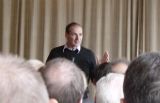dr patrick dixon
i went to a lecture by dr patrick dixon this morning. the lecture was part of a series arranged by the Reading Church's Men's Breakfasts and he'd been asked to speak on personal spirituality in the context of a changing world.
dr dixon regularly lectures around the world on the impact of unceasing change in the modern world. this lecture was different in that he'd been specifically asked to provide an insight in to how he himself responds to these changes and makes sense of the world.
he was most excellent and i highly recommend you see him if you ever get the chance. see the global change website for more info

So what did he say?
you should have been there, you only live 5 minutes drive away ...
it was all about how the world is changing. he uses the mnemonic FUTURE (but i can't remember all the words it stands for - maybe it'll turn up on blogstop one day).
key thing was "how do you measure success". company people talk about share holder value, salaries, promotions etc. but if you turn the question in to "what will people say about you at your funeral" then this gives a different value of success.
another thing was how people generally like helping other people and most people do something beyond their job "for free" ie unpaid, because they want to.
I should explain by the way that this was not one of Dr Dixon’s usual corporate presentations – it was a men’s breakfast meeting on a Saturday morning organised by churches in Reading. They asked him to speak not only about global trends but also about spirituality and faith from a personal perspective, which was interesting
his final point was that people still want to behave ethically, and christianity provides a good model for this. eg no one would dispute that it's best for a child to be brought up by both its biological parents who love each other and the child. this is a biblical pattern of parenthood too.
his personal belief in christianity was made clear and he suggested that even if the audience thought there was a 98% chance that his faith was wrong, then it's still worth exploring. Because even if there is a 2% chance it's right then the implications for those who believe (and those that don't) are immense.
i haven't in any done justice to all the stuff he said and the manner he said it, but these are just a few things that sprang to mind.
All this, and a full english breakfast for £6.
Is this the same Patrick Dixon, an englishman living in Herefordshire who spoke on the Golden Proportion ten years ago in London